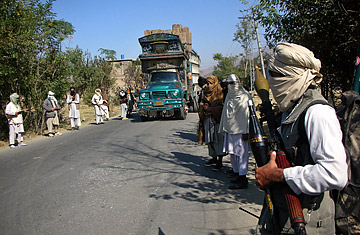
Pakistani pro-Taliban militants stand with their weapons on a street in Swat Valley in 2007
One of the most vivid memories Yasir Nisar has of his 2005 honeymoon is of the "Western" clothes his new bride Cayyada wore as she bundled up in Pakistan's frigid mountain temperatures. For more than a week, the young newlyweds escaped their hectic city lives for a quiet getaway at Malam Jabba, a ski resort located in the heart of the Swat Valley. They shopped for local craftwork, skied at the resort's modest but picturesque slopes and ate various traditional Swati dishes, at times holding hands bashfully. Road closures and blockades were routine — but always due to snowfall.
The Swat Valley in northwestern Pakistan is now the domain of Taliban militants. Bombings have become commonplace in many towns, as have hostage-takings and public hangings. The craftwork is gone. Local music stations have been replaced with extremist radio propaganda. Women have been banned from walking the streets in many locations, and at least a dozen of the valley's once bustling resorts have been forced to close, including Malam Jabba, which militants torched last year. "I have many nice memories there, so I am very sad about it," says Nisar, a photographer from Lahore. Even as cross-border tensions flare between India and Pakistan over the recent Mumbai attacks, many, like Nadeem Sheikh, a businessman in Lahore, feel the crisis in Swat is a much more significant symbol of the country's problems. "This is not the Pakistan I know," says Sheikh, who lives not far from the militarized border with India. (See pictures from Pakistan's tense border with Afghanistan.)
Now, a controversial truce between the Taliban and the government is giving Nisar and many other Pakistanis hope that they may yet return to a vacation land that once held so many pleasant memories. On Tuesday, the Taliban indefinitely extended a fragile 10-day cease-fire with the Pakistani military, granting more time for peace talks to end more than a year of fighting. Last week's agreement to impose a form of Islamic law in Swat has many feeling encouraged that this turbulent region will finally see a return to calm. "The fighting with the military is what made it dangerous," Nisar says. "The tribal people used to have Shari'a law in this part of Pakistan and it was so peaceful, so I think this will make things better."
The implementation of Shari'a law is not bad news to many who believe it will be adopted in its moderate form. Karachi native Jamal Panhwal used to work in Pakistan's now shrinking tourism industry and until 2007, guided hundreds of walking tours through Swat. Says he: "I am quite confident the people causing trouble are not from Swat. The natives of this community are the most progressive Pathans. If law is in the control of the local people of Swat, then everything will be fine."
That remains to be seen. Ahmed Rashid, a journalist and author of a best-selling book about the Taliban, says the recent cease-fire is merely the calm before the storm. "The Taliban do not stop at one demand," explains Rashid. "All this points to a collapse of will of both the army and the government to deal with this in a more logical manner."
